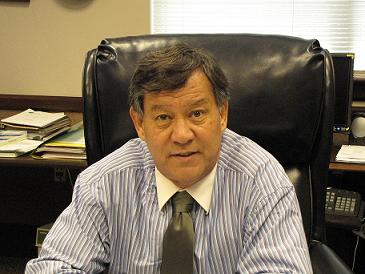
OCEAN SPRINGS – (AP) Ocean Springs schools Superintendent Robert Hirsch spoke no English when he began school in Columbus, Ga., at the age of 5.
The son of an unwed Korean mother, who was 17 or 18, and an American GI, Hirsch was barred from attending public school in the segregated South. His father sent him to Catholic school instead.
That experience with exclusion fueled his philosophy of inclusion that has given Ocean Springs schools the distinction of having almost equal graduation rates for all students, defying a national and statewide trend of a graduation rate gap between black and white students.
“It doesn’t anger me, but it impacted me greatly, the fact that I could not get into a white public school,” said Hirsch, who’s now 62.
He didn’t attend a public school until he was in junior high.
Hirsch found himself in the minority again at age 13, when his family moved to France and he was enrolled in school but didn’t speak French.
“It was around the time the French were kicking Americans out of France,” he said.
It was also a bad time to be an Asian in France, he said. The country had recently lost the Indo-Chinese war.
“So once again I found myself in a position of being the total outside, the total misfit.”
Hirsch, who became a U.S. citizen at 18, began his career as an educator in 1972, about three years after integration.
Hirsch has pushed programs that address minorities and transient students, with whom he also can relate. As a child, he went to 10 schools in 12 years.
“I, as the superintendent, have preached and pounded the pulpit on equity and inclusion,” he said. That’s because, he said, he has found that regardless of race, “if you give children the opportunity, they will step up to the level of opportunity that they are afforded.”
Ocean Springs – a school district with more than 5,300 students, more than 20 percent of whom are black, Hispanic or Asian – has long had little difference in the graduation rates among boys and girls, black or white.
The district’s overall graduation rate is 87.1. The rates are 86.6 for black females, 88.2 for white females, 86.7 for black males and 88.3 for white males.
“The biggest challenge this country faces has not changed in over a century, and that is the issue of equity,” Hirsch said. “Race is a four letter word.”
Oleta Fitzgerald, Southern regional director for the Children’s Defense Fund, says there should be concern about the graduation rates for black males. For black people, there should be concern about the potential loss of a race and culture if what’s happening with black males goes unchecked.
“While the greater number children dropping out of school are black males, we’ve got a dropout problem among all children. There is absolutely nothing in this economy made for school dropout,” Fitzgerald said. The opportunities for high school dropouts are shrinking, she said.
“Everybody has a brain. Everybody has goals. Everybody has ability,” Hirsch said. When given the same opportunities, there is equal success, he said.
That emphasis on inclusion is something Hirsch, who is retiring, hopes will continue in the district while he’s gone.
“Because I hated school and I hated the inequality that I ran into, it has been a priority with me,” he said of inclusion.
“Public education is the mother of opportunity. Public education equalizes many of the inequalities in this country. So public education is the shoulders of America.”
Hirsch acknowledges demographics make a difference. “Everything depends on your parents,” Hirsch said.
Statistically, chances are cut in half for a child raised by a single, poor parent who lacks education. But Hirsch is also an example of someone who beat those odds.
His mother was poor and uneducated. Realizing he would have a better life, she sent him to the United States to live with his father.
“I am forever grateful that she had the courage to get me out of war-torn Korea that was extremely racist against Amerasian children,” Hirsch said in an email.
“Sending me away, however, caused her great heartbreak throughout the rest of her life.”
His mother had been sending cards for him to his American grandmother, who hid them to prevent discontent between his father and stepmother. That was a different time, Hirsch explained, when issues of adoption and illegitimate births were kept quiet.
He was 45 when he came across the cards and wrote his mother.
“She came to visit me four times after that and when she got cancer two years ago, I went to Korea to be with her,” Hirsch said. She died three days after he left.
They were separated for 40 years, he said, but that time did not erode their love for each other.




Be the first to comment